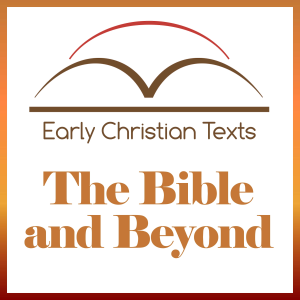
The Bible and Beyond
Religion & Spirituality Podcas
The Bible and Beyond podcast is a series of interviews with scholars who are able to unlock mysteries from extra-canonical books, forgotten scriptures, so-called 'gnostic' gospels, as well as the Bible. Host Shirley Paulson, Ph.D., and her guests explore historical and spiritual questions about Jesus, gender, women, salvation, healing, and the meaning of life. The discoveries these scholars share don’t always fit with what we've been told, but time and again they lead us toward a deeper intimacy with Jesus.
Location:
United States
Description:
The Bible and Beyond podcast is a series of interviews with scholars who are able to unlock mysteries from extra-canonical books, forgotten scriptures, so-called 'gnostic' gospels, as well as the Bible. Host Shirley Paulson, Ph.D., and her guests explore historical and spiritual questions about Jesus, gender, women, salvation, healing, and the meaning of life. The discoveries these scholars share don’t always fit with what we've been told, but time and again they lead us toward a deeper intimacy with Jesus.
Twitter:
@EarlyXianTexts
Language:
English
Contact:
224-661-0884
Website:
https://earlychristiantexts.com/
The Council of Nicaea at 1700 Years: Why It Still Matters
Duration:00:34:49
Is It Possible Paul Didn’t Write ANY of the New Testament Letters?
Duration:00:39:03
Thecla’s Challenge to Both Rome and the Early Christian World
Duration:00:38:22
The Complicated Lives of Enslaved Women of the Bible
Duration:00:33:29
More Connections Between the Dead Sea Scrolls and the Nag Hammadi Library
Duration:00:40:33
Is There a Connection Between the Dead Sea Scrolls and the Nag Hammadi Library?
Duration:00:33:50
Introducing the Gospel of Philip from the Nag Hammadi Collection
Duration:00:34:01
What Was Jesus’s Religious Life Like?
Duration:00:35:05
What is the Nag Hammadi Library?
Duration:00:39:53
What Do Jesus and Plato Have In Common?
Duration:00:31:40
Healing in Antiquity: Medicine, Magic, Ritual, Demons, and Gnosis
Duration:00:31:50
How Can You Tell When an Ancient Text Is Gnostic, Jewish, or Christian?
Duration:00:34:39
Was Jesus a Better Jew than the Jews?
Duration:00:34:01
How Does Paul Understand Resurrection?
Duration:00:38:51
Where Did Gnostic Ideas Come From?
Duration:00:34:05
Apostolic Authority: An Ancient Text Offers a Humorous Critique
Duration:00:35:15
Macrina: A Remarkable 4th-Century Christian Woman
Duration:00:33:29
The Strange "Secret Gospel of Mark" is Likely Real, Not a Forgery
Duration:00:36:39
What Texts Did the Early Jesus People Read?
Duration:00:33:36
Has a Missing Fragment of the Gospel of Mary Been Discovered?
Duration:00:32:05